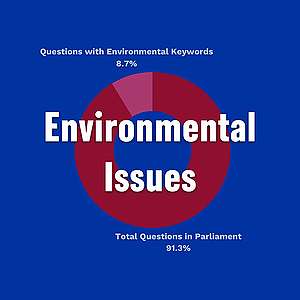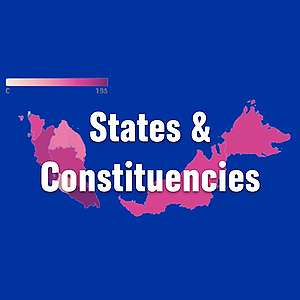Key Takeaways
From 2018-2022, Members of Parliament (MPs) from PH – DAP and PH – PKR raised the most questions in parliament that included environmental keywords.
How often do MP’s in political parties mention environmental keywords in their question?
| Political Party | #No. of questions MP’s asked mentioning environmental keywords |
|---|---|
| PH – DAP PH – PKR PAS BN – UMNO BERSATU PH – AMANAH WARISAN GPS – PBB BEBAS PEJUANG PBM GPS – PDP MUDA UPKO GPS – PRS BN – MCA PSB BN – MIC STAR | 516 314 182 178 102 84 58 50 38 32 31 17 10 8 5 3 2 2 1 |
| Total | 1633 |
*Note: Mentioning environmental keywords does not necessarily indicate a pro-environmental stance.
**Data updated 11 November 2022.



Methodology
- We selected a list of 91 distinct keywords in Malay (and 80 corresponding keywords in English) that are linked to environmental topics relating to climate change, extreme weather, pollution, waste, ecosystem destruction, fossil fuels, deforestation, land use change, water and other environmental issues. See our full list of keywords here.
- Parliamentary Questions: We scraped data from all the federal parliamentary question transcripts (Hansard documents) between 2018 – Oct 2022 to identify which questions were raised by MPs in parliament related to environmental topics (based on our keyword list).
- Public / Media Coverage: We searched media coverage of all federal MPs to identify public statements, commitments, reported actions, and positioning related to climate change and the environment.
- By cross-checking and combining our findings, we have developed a comprehensive database to highlight if and how Malaysian federal MPs are talking about the environment.
Disclaimers
This study scraped parliamentary transcripts (Hansard questions asked by federal MPs) for Environmental Keywords from 2018-2022. It should be noted that mentioning environmental keywords alone does not necessarily indicate a pro-environmental stance.
Our deeper analysis is a work in progress, focused on examining specifically why and how MPs are talking about the environment. We may update with new data findings and ways of filtering & sharing the data.
(Have ideas about how we can further analyse the data? Let us know!)
